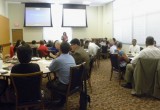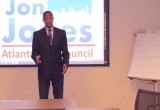Can Direct Democracy Really Work for Atlanta?
Jon Jones' populous message of building a city government controlled entirely by the people is indeed inspiring...but can Direct Democracy really work for Atlanta?
Online, February 13, 2013 (Newswire.com) - And so it starts. Atlanta's election for City Council has officially entered announcing season - the period of the year in which incumbents announce whether they are running for re-election, and challengers announce their intentions to dethrone the current seat holders. So far we've seen Matt Rinker - the openly gay challenger from District 5; Robert Welsh - the city native from District 1; and we've heard Carla Smith announce that she plans to run to retain Atlanta's first District seat. But there's one newcomer who seems to be generating a growing buzz in certain circles. 26-year-old Jon Jones has announced a run for Atlanta City Council's District 2 seat; and along with it, he announced his plan to introduce a new style of governing to Atlanta government. He terms it "Direct Democracy"; what Merriam-Webster defines as "a democracy in which the power to govern lies directly in the hands of the people rather than being exercised through their representatives." Sounds good, right? It conjures up images of flag-waving revolutionists rising up, and working together to claim power over their colony. Can you feel the red, white, and blue coursing through your veins yet? Not so fast. Sure the description of direct democracy sounds great. But what's the catch? What exactly does direct democracy entail, and why should we want it? Jon Jones' populous message of building a city government controlled entirely by the people is indeed inspiring...but can Direct Democracy really work for Atlanta?
Any good reporter knows that the first thing they teach you in Journalism 101 is finding out the "Who, What, When, Where, and Why" of a story. So I'll start there. WHO Jon Jones is still remains much of a mystery. His campaign website says that he is a financial professional with a Business degree from Rutgers University and a Public Policy education from UCLA . His personal website touts the many accolades, awards, and professional certificates he has gained. But aside from that, most people in Atlanta's political scene have never heard of him. He's lived in Atlanta since 2010, his site says, but most of his messaging strays away from defining who he is as a candidate. And that is an intentional pivot. Jones writes that the downfall of our current political system is focusing too much on finding the "savior in a suit" who will answer all of the city's problems. His campaign website bio downplays who he is as a way to portray him as a commoner - no more important than anyone else. And I get it. He can't run on a message of populism and championing the hard work of everyday people if he spends an entire webpage bragging about himself. I totally get it. And I have to admit, part of his "I'm one of you guys" shtick is what adds to the allure that is making Jon Jones so popular among younger constituents.
Which will come in handy when we get to the WHAT that he is offering voters. Jones plans to institute direct democracy by building a system of websites, text message servers, telephone hotlines, and apps that enable residents of his district to participate in legislative decision-making like never before. Imagine that City Council is set to vote on a bill to ban skateboarding at Inman Park. Jones wants to set up a website that will allow residents to vote Yes or No on that bill, and then he will count the total of resident votes, and then himself vote Yes or No according to the final tally. It's like American Idol meets Parks and Recreation. Jones is popular among young voters because he speaks their language: constant reliance on technology in order to communicate. And if that's not high tech enough for you, Jones plans to have push notifications sent out to emails and cell phones so that residents can vote Yes or No on important with their cell phones. (Not to mention setting up a telephone hotline so that people without internet access can participate as well.) Jones writes, "We live in an age of instant communication. We bank online. We shop for food, clothes, and cars online. We even meet new people, and share pieces of our lives with them online... Why has our government not kept pace?" A valid argument made by a man whose generation has seen advances in technology move at break-neck speeds.
But as good as the idea sounds in theory, one can't help but wonder if it would work in reality. I've been waiting for my flying car ever since the Jetsons made me consider it a possibility. But there's no doubt in my mind that if the first batch of flying cars were put on sale today, I'd be reading about 50 airborne collisions tomorrow. The idea of a government that includes everyone has undeniable futuristic appeal. Yet thinking about all of the ways that it could backfire lend to immediate skepticism. Generally speaking, citizens aren't well-informed enough to make policy decisions. Any legislation that that goes before the public would have to be "dumbed down" to a point where the solution is either a Yes or No vote. When asked how he would combat voter apathy and widespread lack of knowledge on the issues Jones responds by asking why we underestimate the intelligence of our city's residents. Using the past T-SPLOST referendum for reference, he asserts that it's very easy to get information to voters; and that with a transparent government, it's even easier for them to seek out information. Some might chalk it up to naivete, but Jon Jones genuinely believes that the people of his district are capable of making informed decisions.
As an example, Jones uses the country of Switzerland - where direct democracy has worked well for years. Large Swiss towns, with hundreds of thousands of people, have indeed demonstrated their ability to decide on complex issues, ranging from taxation to transportation ordinances. The complexity of many of the issues that have gone up for vote has compelled the people of the towns to become more educated if they are not. And this, Jones argues, is cause for Atlantans to want to build a direct democracy of their own. "As it stands today, a politician's job is to try to determine what's in the best interests of all the citizens. Well, who better to determine what's in the citizens' best interest than the citizens themselves?" Jones contends. And he's absolutely correct. Studies show that direct democracy encourages citizens to inform themselves on the issues surrounding them, thus creating a strong incentive for citizens to learn more about their community and play a role in its development.
With this sentiment, almost everyone can agree. People should have a right to control the laws that control their environment. And conversely, people should have the right to oppose a policy in their neighborhood that would worsen their quality of life. How often do we see politicians vote in favor of new nuclear power plants that they themselves would be unwilling to live near? Jones' idea of direct democracy could bring a level of justice to Atlanta by eradicating instances where bad decisions are being made by people who wouldn't have to carry the burden of living areas affected by that decision.
The Washington, D.C.-based Center for Public Integrity recently ranked the state of Georgia as the worst state for government accountability and openness - and the most at risk for political corruption. Loophole-ridden laws, ineffective enforcement, backroom deal-making, and weak rules for disclosing conflicts of interest earned Georgia an F grade. A major point in Jones' case for direct democracy is that it could drastically curtail a political climate that is awash with special interest cash and lobbyist influence. Rich and well-organized interest groups spend millions annually to persuade elected officials to pass legislation that often-times is at odds with the electorate. But if Jones can successfully build a system where the people would decide the vote, lobbyists lose the opportunity to rig the process in their favor. Or - in an alternate universe - refocus their lobbying efforts to the general public. (Which could be a bad thing, but my neighbors and I wouldn't mind it too much if a lobbyist tried to buy our vote with a steak dinner every now and then.)
Direct democracy has its merits, and it has its shortcomings. There's no debating that. Whether direct democracy is a feasible idea, and whether the people of Atlanta are ready to undertake the task of building such a system...well that remains to be seen. If nothing else, Jones is at least forward-thinking. In August of 2012, Jones recorded a video that said that one of the pitfalls of our current political system is that council members could potentially author a bill that increases their pay, and then collectively vote to approve the measure. And what do you know; only 5 months later did Atlanta's city council members pass a bill that increased their annual salary by a massive 52 percent. This point alone is often cited by Jones' supporters that he is ahead of his time. And his rare enthusiasm for technology (he designed and built his own website. How many candidates can say that?) compels many supports to liken his pursuit to build a technology-based social/civic infrastructure to the early ventures of Mark Zuckerberg (founder of Facebook), and even Bill Gates.
But Jones' vision of making Atlanta the first US city with direct democracy is a long way away from fruition. Before even embarking upon the task of building a system that truly incorporates every district resident (without leaving technologically inept residents in the dark), he has to battle his way through 9 grueling months of election politics; and win. Jones is going up against a popular incumbent, Kwanza Hall - who even Jones admits he has nothing negative to say about. Hall has served for 7 years, ran unopposed in the last election, and enjoys a campaign war chest with funds in excess of $100,000. Jones, on the other hand - equipped only with a tech-savvy team of volunteers, a social media prowess common only to a Generation Y candidate, and a campaign ledger with cash-on-hand of just under $2,000 - acknowledges that the odds of his victory are slim. Nevertheless, Jon Jones remains committed to making sure that every voice in the community gets heard. Are we ready for Direct Democracy? "This election demonstrates that people have the right to decide," Jones answers. And with that, I have to agree.



